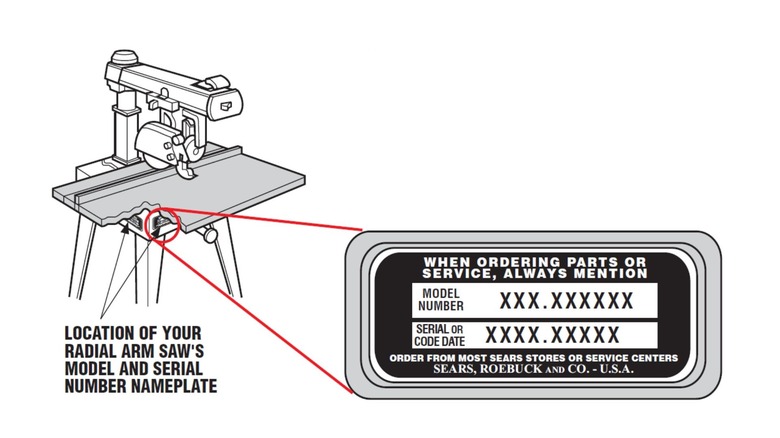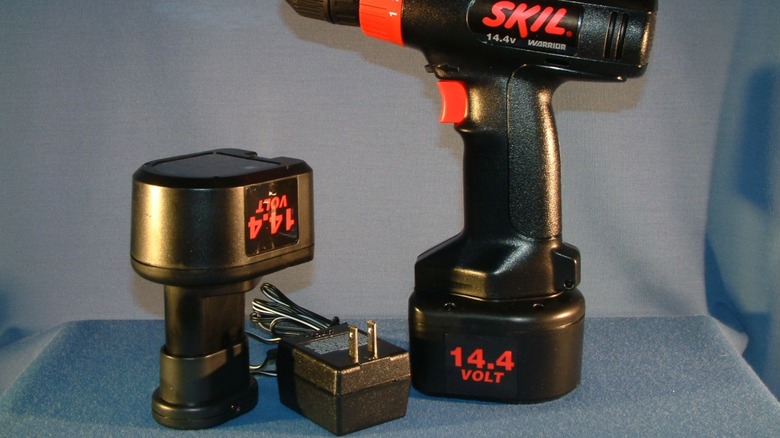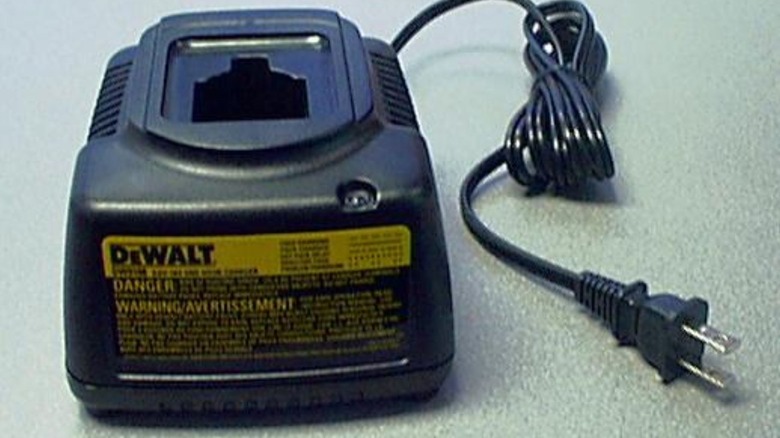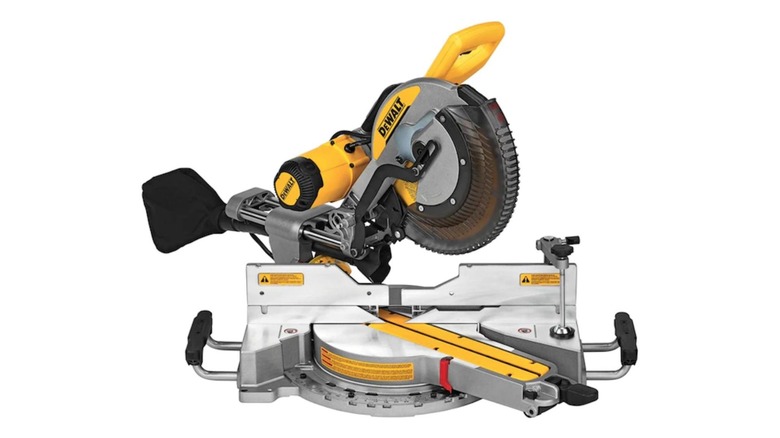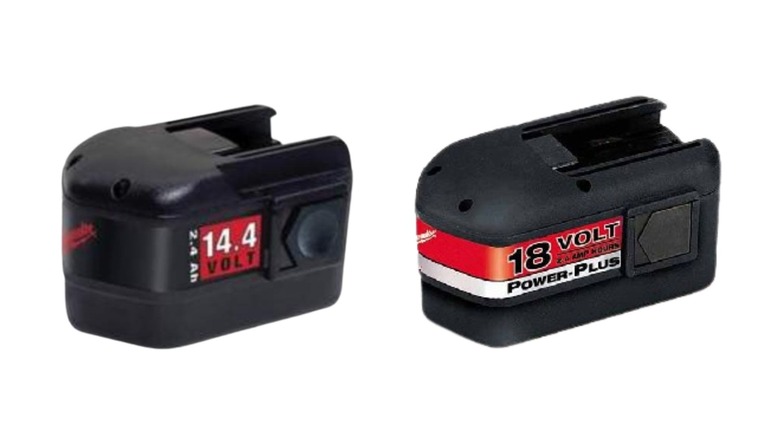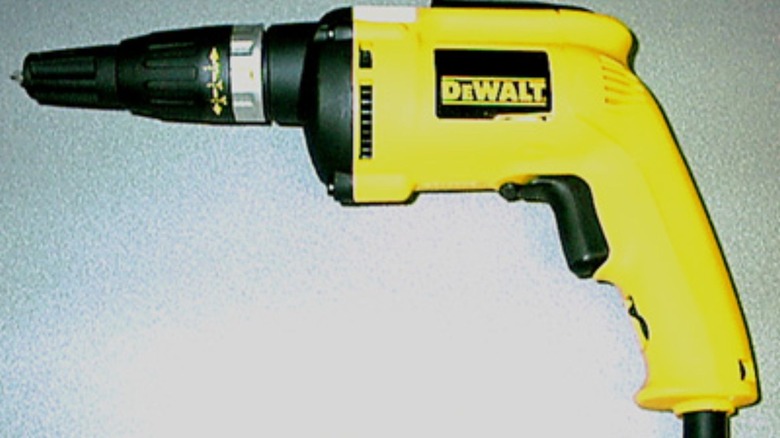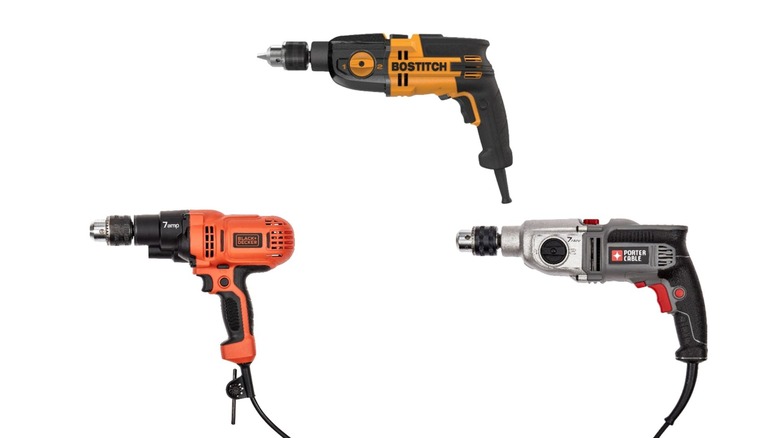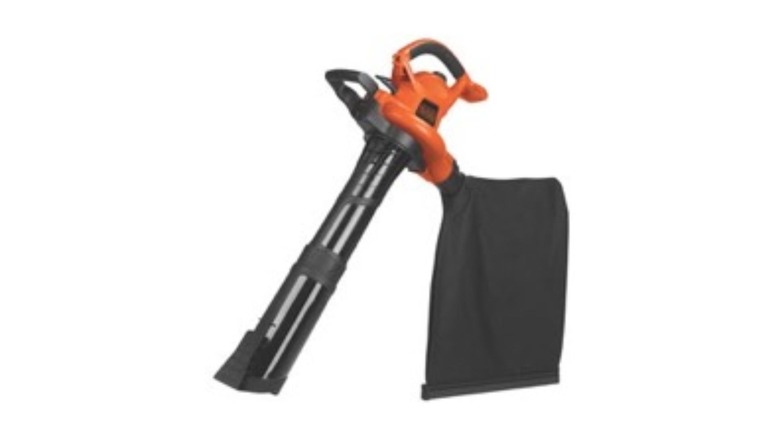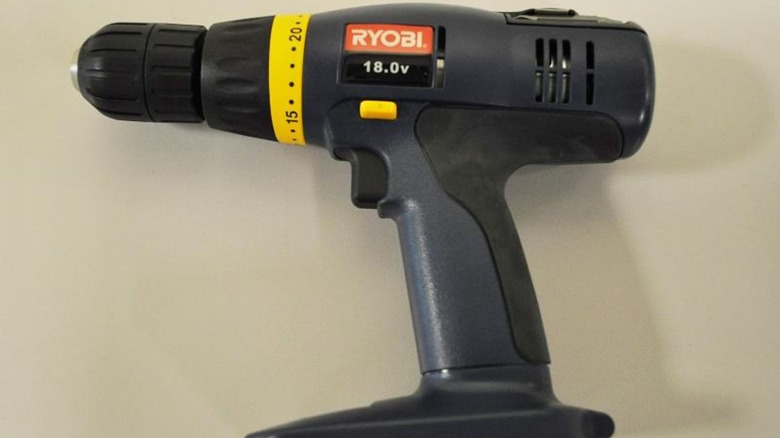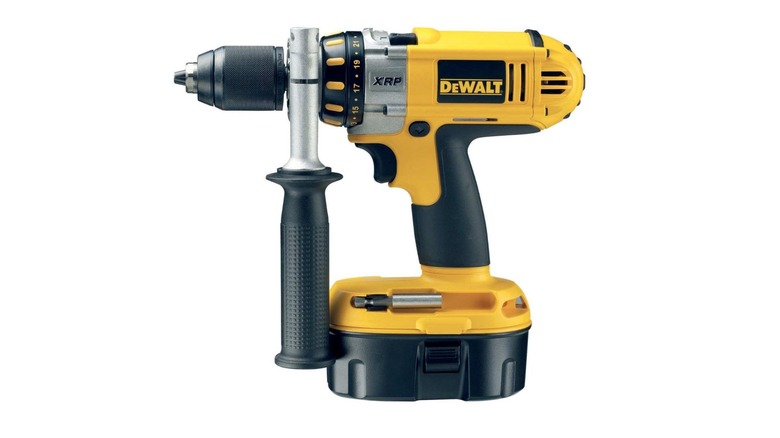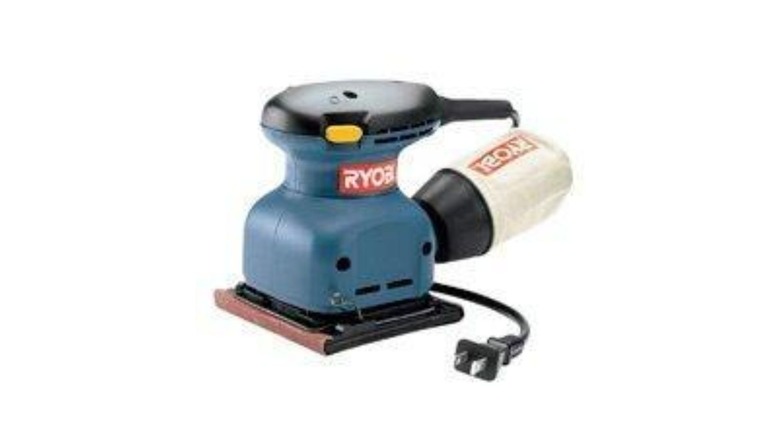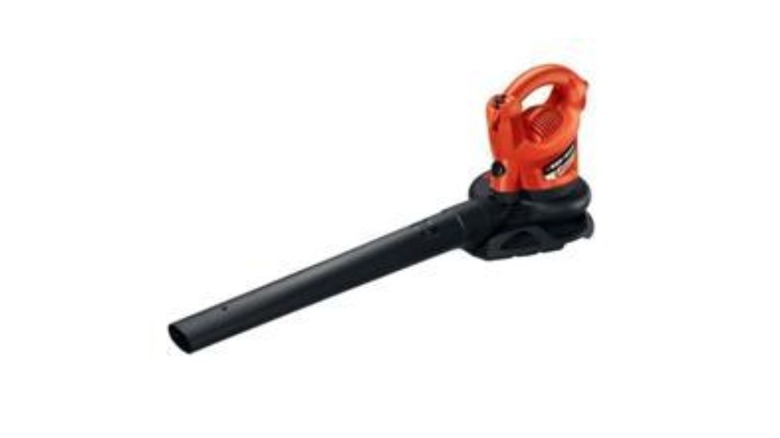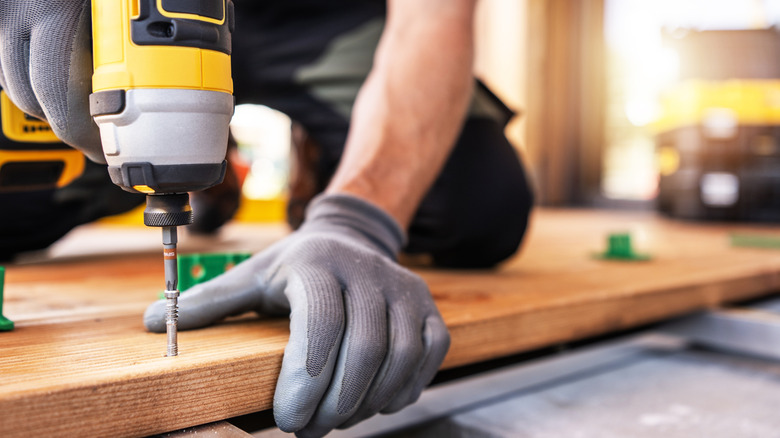The 12 Biggest Power Tool Recalls In US History
Whether you're an amateur DIYer or you've taken on more home projects than you can remember, having good, reliable power tools on hand can help immensely. While every major power tool brand likely has multiple gems in its lineup, most of those brands have encountered a flop or two (or 10) by way of a nationwide recall.
Nearly half of the biggest power tool recalls we rounded up here involve a million or more units in the U.S. alone. Some of the risks associated with these recalls are fairly minor, while other dangers include potential shock damage, lacerations, fires, or even explosions.
Even though you might not frequently hear about power tool recalls in your daily dose of news, rest assured they still happen, even after decades of safety legislation and countless production tests. That's one of the biggest reasons why you should register your power tools, as you'll get a direct notification from the manufacturer if any of your tools are ever subject to recall.
Without further ado, let's dive into the 12 biggest power tool recalls in U.S. history. See if you can spot one of your go-to tool brands or a common theme among frequently recalled power tools.
Craftsman radial arm saws (3.7 million units)
In November 2000, Missouri-based tool company Emerson issued a recall for a whopping 3.7 million Craftsman radial arm saws. The units were "sold without a guard that covers the entire blade," which obviously presented a huge risk to consumers. In addition to laceration risks from an uncovered blade, the saw could accidentally "[kick] back" cut pieces of wood at a dangerous speed and force.
Between the U.S. Consumer Product Safety Commission (CPSC) and Emerson, roughly 300 reports were received detailing injuries caused by these radial arm saws. Reported injuries are pretty gory, including "hand and finger amputations; lacerated hands, arms and fingers; fractured hands and fingers; and facial injuries."
The recall included Craftsman 8-, 9-, and 10-inch radial arm saws with a model number starting with 113 that originally sold for $100 to $700, depending on the exact model and when it was purchased between 1958 and 1995. The CPSC says the remedy for this recall was a refund, but we can only find text that reads "Emerson will provide $100 for the return of the saw carriage," so it's unclear whether customers received just $100 or $100 in addition to a refund of their purchase.
Starting in July 2019, the remedy for this recall changed. Now, customers can go to a website hosted by Emerson, enter their saw's model number to see if it's included in the recall, and receive $50 from the company after following a set of four steps.
Skil Warrior drill battery chargers (2 million units)
Apparently, it's difficult to get a battery charger or pack just right, even in the power tool world. Battery-related recalls are some of the most common, and it's not just limited to one or two brands.
This particular recall was issued in February 2003 for Skil Warrior drill battery chargers, which were sold across the U.S. from July 1994 up until the recall date in February 2003. Across all the different models involved in the recall, a total of about 2 million units were recalled.
The drills were pulled from shelves due to issues with the transformer inside the charger overheating, which could cause the plastic housing to "melt and deform, possibly igniting flammable materials near or on the charger." Robert Bosch Tool Corp., the company selling Skil Warrior drills, received 160 reports of the battery chargers overheating and one report that actually involved a fire and property damage.
Consumers were instructed to unplug the charger immediately and told they'd get a $25 rebate to use on any Skil power tool. The chargers were reportedly sold for between $21 and $30, so some consumers didn't get the full value of their purchase back in the recall remedy..
DeWalt and Black+Decker battery chargers (1.7 million units)
Thanks to an issue with automatically shutting off, about 1.7 million DeWalt and Black+Decker battery chargers were recalled in late December 2000. Because they wouldn't automatically turn off after the battery was fully charged, the battery could possibly "burst" and cause "fire, burn and electrical shock hazards to consumers."
By the time these battery chargers were officially recalled, DeWalt had received two customer-reported incidents involving bursting batteries and minor injuries. Past those two incidents, it looks like DeWalt and Black+Decker were successful in preventing further injuries across the 1.7 million affected units.
Whether you bought one of these battery chargers on its own or as part of a package with a cordless tool from DeWalt or Black+Decker, the recommended remedy was the same. Consumers were told to stop using the battery chargers right away and to bring them to an approved service center to get a free replacement.
Leaving your battery or tool charging after it's fully charged is one of the most common mistakes you can make when using a cordless drill. In addition to possible overheating risks, overcharging a battery can lessen its ability to keep a charge.
DeWalt 12-inch sliding compound miter saws (1.4 million units)
About 1.25 million DeWalt 12-inch sliding compound miter saws were recalled fairly recently in August 2022, and that's just in the U.S. alone. Adding Canada's recalled units into the mix adds about 118,000 to that total.
According to the CPSC, the rear safety guard on the miter saw could "break or detach, posing an injury hazard due to projectiles," as well as a laceration risk to the consumer, "who could come into direct contact with the saw blade." In total, DeWalt heard about 571 different reports of this safety guard issue, nine of which specifically involved laceration injuries.
This recall involved miter saws sold across multiple hardware stores between April 2019 and May 2022. Consumers were instructed to stop using the recalled saw until they could get it repaired, either through a free repair kit or through a free visit to a DeWalt service center.
Milwaukee Power Plus, Chicago Pneumatic, and Extractor battery packs (1 million units)
Due to possible explosion and laceration risks, roughly 1 million battery packs were recalled in July 2007 across multiple brands. Among the 35 incidents reported to Milwaukee, 11 specifically mentioned injuries from exploding batteries, including "minor cuts, bruises and some hearing loss."
This recall involved 14.4- and 18-volt 2.4 Ah NiCd battery packs from Milwaukee Power Plus, Chicago Pneumatic, and Extractor. The battery packs were most commonly used in power drills, saws, radios, and flashlights and were sold for quite a while, between July 1999 and 2005.
Some consumers purchased these battery packs as individual items, while others received a battery pack with a purchased tool or kit. Regardless of how you received the faulty battery pack, the remedy was the same. If consumers had a battery pack involved in the recall, they were instructed to stop using it right away and contact Milwaukee to start the process of receiving a free replacement battery pack.
DeWalt corded electric screwdrivers (660,000 units)
While overheating batteries and laceration hazards tend to be two of the most common reasons power tools get recalled, there are plenty of other dangers to be aware of. In November 1998, about 660,000 DeWalt corded electric screwdrivers were recalled due to reports of users being shocked while using the tool.
In total, DeWalt received 40 reports of users being shocked while using a corded electric screwdriver, with three reports outlining injuries stemming from the shocks. The recall involved multiple screwdriver models sold by DeWalt, Grabber, and Black+Decker between November 1996 and September 1998 at various hardware stores across the U.S.
Per the recall information via the CPSC, consumers with these corded electric screwdrivers were instructed to stop using them at once and take them into a local DeWalt or Black+Decker service center to receive a repair free of charge.
Despite the large number of units recalled, it seems to be a fairly isolated incident for the company, as its corded electric screwdrivers didn't land on our list of DeWalt products you should steer clear of in the future.
Black+Decker, Bostitch, and Porter-Cable hammer drills (641,000 units)
On select hammer drill models from Black+Decker, Bostitch, and Porter-Cable, there was a plastic side handle meant to increase the drill's stability during use. Unfortunately, the side handle on these drill models was found to "slip or break, leading to a loss of control of the tool."
About 641,000 hammer drills across the three brands were recalled in the U.S. in November 2018, along with an estimated 18,000 units sold in Canada. According to the CPSC, Black+Decker heard of at least 11 reported incidents of the side handle on a hammer drill slipping or breaking while in use, one of which noted a "torn rotator cuff injury."
These hammer drill models were sold at major hardware stores and online retailers between January 2010 and July 2018. When the recall was issued in November 2018, consumers were told to stop using the drill as-is and contact Black+Decker to get a free replacement side handle before continuing to use the tool.
Black+Decker 3-in-1 electric leaf blower (560,000 units)
At first glance, plenty of shoppers probably thought this 3-in-1 Black+Decker tool was a steal. This power tool acts as an electric blower, vacuum, and mulcher, all in one convenient package. However, about 560,000 3-in-1 blower models were recalled in September 2016 in the U.S., along with about 20,000 units sold in Canada.
The fan cover on these 3-in-1 electric tools could "unlatch unexpectedly, posing a laceration hazard" to consumers. Prior to the recall going into effect, Black+Decker reportedly heard of four separate incidents of the tool's fan cover coming off and "consumers receiving finger lacerations" because of it.
Affected models were sold at Lowes, Amazon, and other major retailers between May 2013 and September 2016. Instructions with the recall encouraged consumers to stop using the 3-in-1 blower right away and contact Black+Decker directly to receive a free repair kit with a replacement fan cover to use.
Ryobi Model HP 1802M cordless power drills (455,000 units)
Inadvertently covering the air vents on a drill and causing it to overheat is one of the most common mistakes you can make when using a power drill, but unfortunately for Ryobi, this particular overheating issue wasn't caused by user error.
Over 450,000 Ryobi power drills were recalled in October 2010 because of overheating issues with the drill's switch. Among the 47 reports Ryobi collected, two specifically mentioned "minor burns from touching an overheated switch." Other reports highlighted broader dangers with the drill, including general overheating, smoking, melting, and even catching fire, with 12 accounts mentioning property damage to homes or vehicles.
It's not clear whether the issue was with the 18-volt rechargeable NiCad battery inside or a fault with the drill's housing. Regardless, if consumers had one of these recalled Model HP 1802M cordless drills, they were instructed to stop using it at once, remove the rechargeable battery, and contact Ryobi to get a replacement drill free of charge.
DeWalt cordless drills (346,000 units)
A good cordless drill can offer quite a few unexpected uses, like assistance with cleaning and gardening, but maybe skip these recalled DeWalt cordless drill models if you're shopping for a used option. Five specific DeWalt cordless drill models were recalled in December 2007, with a total of roughly 346,000 units recalled altogether in the U.S.
Sold between June 2006 and December 2007 at prices ranging from $180 to $280, these cordless drills were recalled due to the trigger switch overheating and "posing a fire hazard to consumers." Luckily, among the 11 reports DeWalt received in regard to these five drill models, there were no injuries or property damage.
For anyone who purchased one of the five recalled cordless drill models, the CPSC's advice was to stop using the drill immediately and get in touch with a DeWalt service center for the drill to be inspected and repaired, if needed.
Ryobi ¼-sheet sanders (300,000 units)
In May 2011, approximately 300,000 Ryobi ¼-sheet sanders, specifically model S651D, were recalled because the company was getting reports that pieces of the fan were breaking off of the assembly and "posing a laceration hazard to consumers." All in all, Ryobi received 31 unique reports of "broken fan pieces being ejected from the sanders," two of which documented minor lacerations.
These recalled models were relatively cheap power tools, priced at around $30, and were sold between June 2005 and August 2010 at various hardware stores. There wasn't anything that could simply be replaced with the S651D model, so any customers who had purchased one of these sanders were instructed to stop using it right away and contact One World Technologies to receive a replacement sander free of charge.
If you're shopping around for a used ¼-sheet sander and want to avoid this Ryobi model, the main body is blue, and the CPSC says the sander's model number is on a data plate on the side, right below the handle.
Black+Decker BV4000 blowers/vacs (272,000 units)
Thanks to a "loose connection between the blower/vac and an extension cord," roughly 272,000 Black+Decker BV4000 were recalled in October 2006. The big issue this loose connection posed was overheating, which could potentially cause fires to break out.
According to the CPSC, Black+Decker received 187 reports from people who purchased a BV4000 blower/vac, with concerning details of the tool smoking, melting, or producing fire near the plug. Seven of these documented reports noted minor burns.
Although the recall happened in October 2006, the BV4000 blower/vac was sold at multiple hardware stores between April 2004 and July 2005. If you were one of the unlucky customers who purchased one of these recalled blower/vacs, the recommended action to take was to first stop using the blower/vac at once, and then get in contact with Black+Decker to get a free repair kit that could remedy the issue.
Methodology
All recalls from major power tool brands can be sourced from the Consumer Product Safety Commission (CPSC) website, where documentation can be found from the current year dating back decades.
To find the biggest power tool recalls in U.S. history, the CPSC was our main resource. We took the time to manually research every single one of the best-selling power tool brands, including but not limited to Ryobi, DeWalt, Black+Decker, and Milwaukee. After searching the brand's name, we combed through all of the available recalls specifically related to power tools to find the recalls with the largest number of units involved.
While other recalls may have been more serious in terms of injury inflicted on consumers, this list is expressly covering defective power tools with the highest number of recalled units.
It's also worth noting that just because these brands were involved in some of the biggest power tool recalls in U.S. history, that doesn't necessarily make them a bad or untrustworthy brand. No matter what power tool you're adding to your home, it's up to you to do your research and filter through reviews to find a reliable option — and even then, there's no way to tell which power tools could be recalled, so make sure you always register your tools right away.

